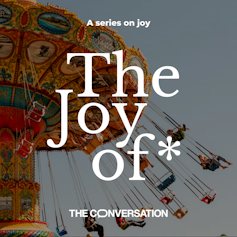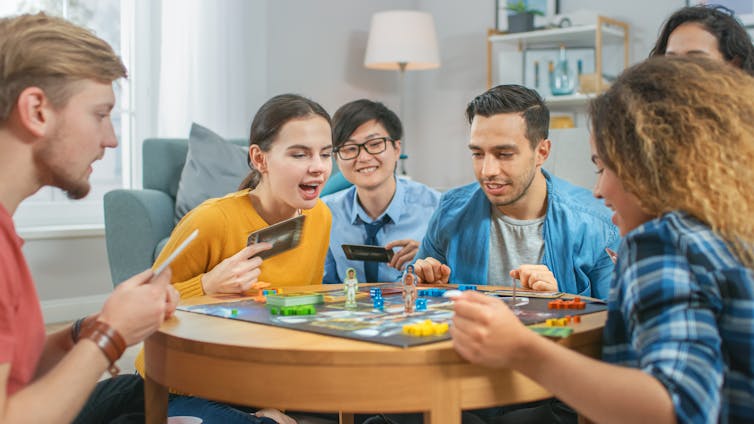Becoming an adult often seems to mean leaving play behind. The term “adulting” refers to doing things that are joyless, boring and tiresome – the opposite of play. But we can embrace adulthood while still finding joy through play and being playful.
You might not realise it, but when you swing in your chair, slip off in an imaginative daydream, play sport for fun and not just to win, try something new that you are comfortable to fail at, laugh at a joke with a friend, read a book for pleasure or make something that doesn’t need to be judged or perfect, you are playing.
Play is an activity that we choose to do because we want to do it – it is never forced. Play is low stakes, and we do it because it feels good. What’s more, play and playfulness is good for us. Even thinking about times we were playful can increase our wellbeing.

This is an article from The Joy Of*, a series to help those of us in our 20s and 30s find moments of happiness in the everyday. When rents are rising, fun with friends is more infrequent and we’re struggling with work-life balance, daily life can seem hard. But joy doesn’t have to be something saved for big occasions, like weddings or birthdays. These articles from Quarter Life are aimed to help you find joy in the smallest things.
Play helps us to be able to think through possibilities so that we can anticipate outcomes and respond more creatively. It helps us react flexibly and without excessive fear to situations we find threatening. Play allows us to engage in trial and error learning, to do something and get it wrong.
As a child you might have climbed a tree when you were playing. Climbing a tree allows us to think through possible next steps: which branch next, will it hold my weight, what will I do if it breaks? It also puts us in situations where we need to react flexibly: if there’s an imaginary bear chasing me up the tree, what should I do to escape?
Play is good for us
Positive emotions such as joy from playing increase our capacity to learn. Positive emotions help us be more open minded, and support us as we learn new skills and develop new ways of seeing things. With these additional resources, we are more likely to be motivated to engage in new activities and social relationships.
One of the most critical functions of play is to help our social development. It gives us a space to interact with others in positive ways. Play is our direct route to social joy.
In short, play increases joy and decreases distress. Research with university students found that those who were “playful” – those who, for instance, acted spontaneously and joked around – had lower levels of perceived stress than their less playful counterparts. By increasing positive emotions, playfulness helps us cope with stress and improve life satisfaction.
Here are a few tips to help you find joy through play.
1. Learn how you like to play
One of the easiest ways to become more playful as an adult is to tap into our childhood play patterns. Revisit what you liked to play with and how you liked to play. The National Institute of Play has some great online resources to help you figure out your play personality. Perhaps you like competitive games, or maybe you prefer to play through movement, like dance. Maybe you like to collect things or explore new places.

Gorodenkoff/Shutterstock
Finding your personal play identity will help you discover the kinds of play activities that you are likely to get most engaged in, and the ones that will tap into your emotions and help you experience joy.
This might be the time to pick up a childhood hobby you have left behind. Did you love to go rollerskating, or did you collect football stickers, or play video games with friends? Make time again for those things that brought you joy.
2. Plan to play
Making a plan to play might seem counter-intuitive, but scheduling time for things that are important is valuable. Make a “playlist”: write a list of playful activities or hobbies you have enjoyed doing or would like to try. Examples might include dancing, making art, visiting a museum, playing games, singing, or going sightseeing.
Take your time and keep adding to your playlist over a few days. Then when you have your list of playful activities, plan out what you can do every day over the next week to play. Reach out to others who might want to join you. And then, start playing – even if it’s just for five minutes.
3. Reflect on play
As adults we don’t always have the time to play or be playful. But just taking some time to reflect on past playful moments, or times others were playful with us, can help improve our wellbeing and reduce depression.
For a week, spend 10-15 minutes before bed and write down three playful things you’ve experienced during the day, who was involved in them, and how you felt at the time. Or, you could count how many playful moments you encountered during the day.
Your play personality is bursting to get some joy. Get reflecting and remembering, and start playing and engaging in old hobbies.
Quarter Life is a series about issues affecting those of us in our 20s and 30s.




